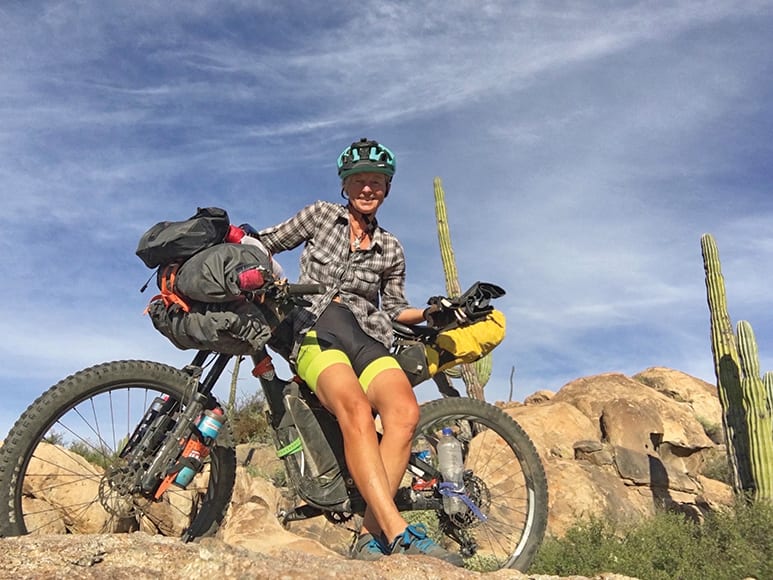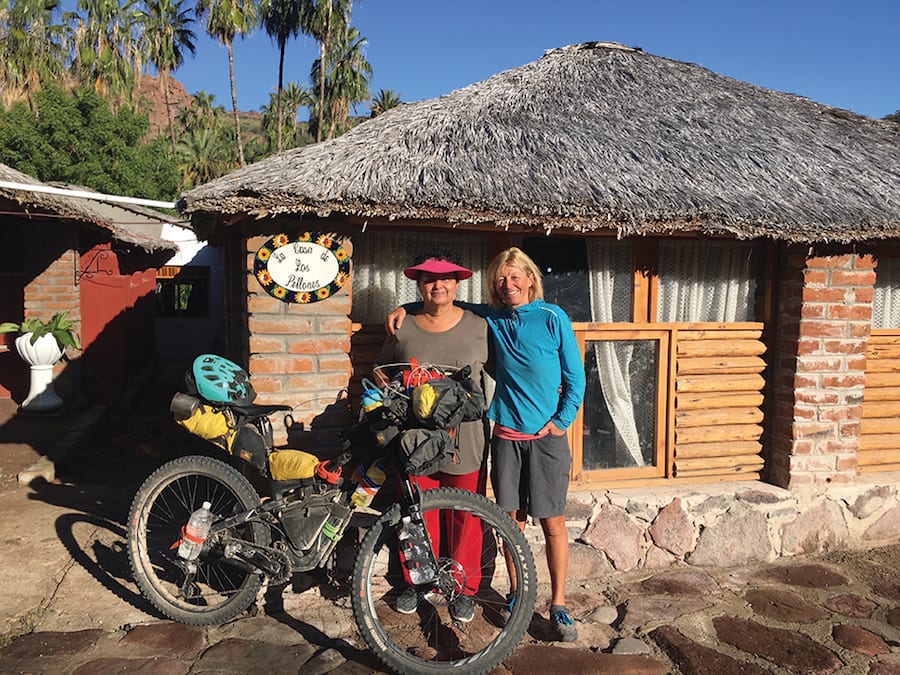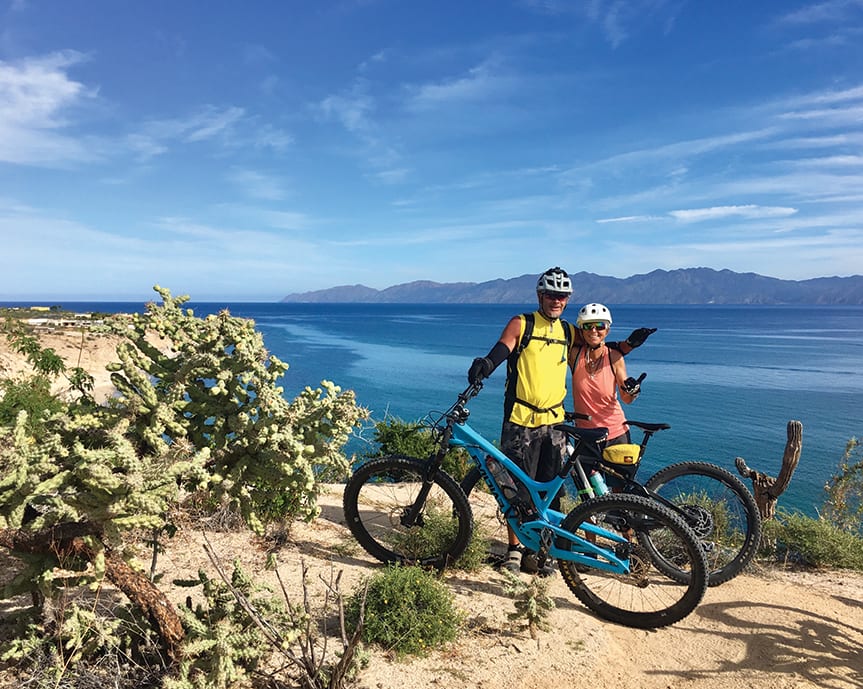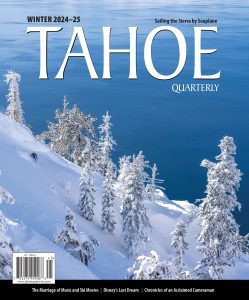
27 Sep From Tragedy to Triumph
Life challenges inspire Tahoe resident to complete solo bike ride from Carnelian Bay to Mexico
Almost anyone facing Alenka Vrecek’s situation would have retreated into survival mode. But when her body was battered by cancer, her husband diagnosed with Parkinson’s and her daughter bouncing back from a devastating car wreck, Vrecek pedaled more than 2,500 miles over 158,000 vertical feet of mountains and hills from Tahoe to Mexico.
It was an act of defiance, a show of remarkable strength and an improbable, soul-healing journey that brought clarity back to her tumultuous life.
Like many local residents, Vrecek moved to North Lake Tahoe with plans to stay only one winter. Originally from Solvenia, she arrived in 1984, joined the University of Nevada, Reno ski racing team and dove into an active Tahoe lifestyle. She coached youth skiing at Squaw Valley, worked at River Ranch and painted houses using her rock climbing skills. She married and raised three ski-racing kids before eventually remarrying, to Jim Granger, in 2008. She founded Tahoe Teas the same year.
All was good for Vrecek and Granger. They skied and mountain biked around Tahoe, kite surfed and paddleboarded on the lake, and occasionally made the trek to their rustic palapa near La Ventana in Baja, Mexico, for what Vrecek calls “glorified camping.”
Then, starting in 2011, Vrecek faced a series of daunting emotional and physical challenges: Her daughter nearly died in a car accident, a grievously torn knee was followed by surgery gone wrong, she was diagnosed with breast cancer and a severely compromised colon, and she learned that her husband had Parkinson’s disease.
Yet, just two years after the devastation that is cancer treatment, at the age of 54 she rode her bike from her Carnelian Bay home to her second home in La Ventana—by herself.
She undertook the journey to prove in her mind that she was still alive and kicking. She told the tale of that adventure through blog posts as she rode, and now is converting her story into a memoir that she hopes will inspire others who have faced similar challenges.

Alenka Vrecek in Yosemite Valley on day three of her solo bike ride from Tahoe to Mexico, courtesy photo

Vrecek by her daughter Mateja’s side in the hospital, courtesy photo
Life Trials
On August 2, 2011, Vrecek got the phone call that is a parent’s worst fear. Her oldest daughter, Mateja Lane, had been in a horrible car accident on Highway 89 between Alpine Meadows and Squaw Valley.
The man who first arrived at the scene climbed through the back window of Lane’s truck and lifted her head from a pool of blood.
“She took a breath, and at that moment she came back to life,” says Vrecek. “It’s a surreal experience when you get that call—like you are watching someone else… You go into survivor mode. As a mother, you drop everything.”
Lane, who was 22 at the time, broke her femur as well as every bone in her feet. She had a collapsed lung, broken arm, ribs and facial bones, and serious bleeding in the brain. She had survived the crash, but was in bad shape.
Vrecek stayed by her daughter’s side for most of the next two months while she slowly recovered in the hospital.
“I always look back at the accident and think it was much harder on the people around me, to have to watch me heal,” says Lane. “You don’t have much choice; you just have to get better.”
As Lane continued to recover, Vrecek returned to her life operating Tahoe Teas, coaching skiing at Squaw Valley and enjoying life with Granger.
From Bad to Worse
Then in 2016, the next hammer dropped when Vrecek blew out her knee on a snowy day while coaching a group of kids at Squaw.
“The surgery went wrong,” she says, explaining that her femoral nerve was severely damaged, causing constant and painful spasms of the muscles above the knee.
Facing her own long recovery, Vrecek was on crutches when she discovered a lump in her breast. She was diagnosed with cancer.
“The first weeks, waiting for the diagnosis, was the worst part,” she says. “Then you go through the treatments. You have to get through it and survive. You have to be strong for the people around you.”
Vrecek started chemotherapy on August 2, 2016: the fifth anniversary of her daughter’s accident. The treatments took away much of her energy and left her brain foggy. She found healing by swimming in Lake Tahoe, which was the only activity that gave her peace and got her body moving.
“I tried to stay positive and upbeat. When you are that way towards nurses and doctors, I think it comes back to you in a positive way. If you present yourself as ‘poor me,’ nurses treat you that way as well,” says Vrecek. But while she tried to remain strong, she also felt fortunate to be surrounded by a loving family, especially her husband. “Jim had a silent way of being there for me. His role was to hold me at the end of the day, and that is what I needed.”
In the midst of fighting cancer, Vrecek reached the age for her first routine colonoscopy. After the procedure, the doctor took her hand and explained that he had removed many polyps in several sections of her colon. “He referred to it as carpeting of polyps and right then and there recommended a partial colectomy.”
Meanwhile, Granger received his own bad news.
“I was sure that the tremor I was noticing in his right hand was related to all the hard work and stress we were both going through,” says Vrecek. “It wasn’t. It was Parkinson’s.”
Despite Granger not feeling well from his new medications, the couple set off on a trip Vrecek had planned to a small atoll in French Polynesia. She hoped it would give her husband and her a chance to catch a break from the recent news by sailing in one of the most beautiful places on earth.
On that trip, she did get a glimmer of hope when the doctor told her she could wait to remove her colon, and try to manage what polyps still remained by more regular colonoscopies. It was the first piece of good news she’d received in months.

Vrecek takes a break after a long and strenuous climb accompanied by strong Santa Ana winds in Southern California, courtesy photo
On the Mend
Vrecek’s cancer treatment concluded in 2017. She felt herself coming back to life. Her hair grew back, and while still weak, she drove with a friend to Mexico.
Baja had long held a special place in her heart, having owned her place there for over 20 years. It was where she could completely relax and open up.
While in Mexico, friends told her about the Baja Divide: a bike route on dirt roads from the top to the bottom of Baja.
“It was brand new and that got me excited about the concept,” says Vrecek, who, nearly two years after her treatments ended, had returned to her active Tahoe lifestyle.
“But in many ways, I felt like I was stuck,” she adds. “I wanted to do something more significant, more challenging. I wanted to do something I’d never done before, yet always wanted to. And I wanted to do it before my time ran out.”

Vrecek often carried over 60 pounds of gear on her bike, courtesy photo
Mapping Out a Plan
Vrecek returned and started obsessing about the concept of riding her bike from Tahoe to Mexico. She spent hours on websites coming up with routes and learning about bike packing. She turned to Olympic Bike Shop in Tahoe City, which provided her with the assistance needed to get organized and determine what technology she would need.
Granger watched as she made plans and at first hoped she would give up when she realized how difficult it would be.
“But she wouldn’t stop talking about it,” says Granger. “She is very determined, and I was very concerned. I’m not going to pretend I wasn’t.”
While Granger is doing quite well in responding to his Parkinson’s treatments, one impact of the disease is that he is more anxious than he used to be. But he was not alone in his concern.
“When she told us her plan for the ride, I remember we all thought she was a little nuts, going on that long journey, by herself, not too long after radiation and chemo,” says Lane, who was also concerned about the strength of her mom’s knee after the problems with her surgery. “There was not much chance of changing her mind, though. When she decides to do something, she is set in her decisions. We decided to be a good resource for her along the way.”

Vrecek met many kind people along the way, including a man cooking outside of Three Rivers who gave her a bag of spices, courtesy photo
The Ride
Vrecek rode away from her Tahoe home on September 28, 2018. Two months later, after climbing over 158,000 feet and traveling more than 2,500 miles, she reached her home in Baja.
Her route took her from Tahoe via U.S. Route 395 to Yosemite, where she climbed over the grueling Tioga Pass. From there she followed what her Adventure Cycle Map calls the Cascade Sierra Divide. The route, which runs along the western edge of the Sierra, turned out to be much harder than she expected, with many summits over 7,500 feet in elevation.
“If I knew what I was getting myself into, I doubt I would have done it,” Vrecek concedes.
She entered Mexico at Tecate and immediately began south on the Baja Divide. She camped most of her route but occasionally spent the night in a cheap hotel to recuperate and shower. On one occasion, a family she met put her up for the night. She took only three rest days so she could reach her Baja home in time for Thanksgiving.
Wiry and athletic, Vrecek started the ride at 110 pounds and often carried over 60 pounds on her bike. By the time she finished she was down to 98 pounds.
While Vrecek admits that the ride took its toll physically, she says the toughest part was knowing how much her husband was worrying about her back in Tahoe.
Despite the difficulties—the incredible distance, finding a route that was safe and rideable, and doing it all with a damaged leg—the process made her feel alive and successful, something she felt was sorely missing in her life.
She felt that the most important thing she got out of the ride was the confidence it gave her. She realized that if she put her mind to something, she could get through it. And she knew that applied to all aspects of her life.
“As challenging as it was to travel by myself, I really liked it,” says Vrecek. “I think you meet people in a very different way. You have to be self-reliant, but there are people out there who can help when needed. We have such fear about Mexico and I want to share that part of the story. There are great people everywhere.”

A woman named Rosalva and her husband Omar graciously hosted Vrecek in the mission town of San Jose de Comondú, courtesy photo
A Bright Outlook
Lane was impressed with how her mom set to work writing a several-hundred-page memoir shortly after the ride—not just about the experience, but about overcoming the challenges she had faced in her life.
“She is a great example of how, when you put your mind to something, you don’t have to let injuries define what you are,” says Lane. “She didn’t let breast cancer and other medical issues stop her from doing what she wanted to do.”
After the ride Vrecek and Granger spent most of the winter in Baja. While the trip was partly for rest and recuperation, it was also because Vrecek hasn’t skied since her knee injury three years ago, making Baja a better place for them to both get the exercise they need. Granger, especially, has found that the key to keeping Parkinson’s at bay is regular exercise.
But while wintering in Mexico has its advantages, Vrecek admits that she misses winters in Tahoe. “I miss the skiing family. I miss coaching,” she says.
Through Vrecek’s struggles, and her remarkable athletic accomplishment in the wake of her trials, she has gained a newfound perspective on life.
“What we should never take for granted are the people who matter in our lives,” she says. “In the end, life is about people who are near and far and touch us every day and not the material things we surround ourselves with. None of us stay around forever, though. Let’s pause every once in a while to say hello and smile even to a stranger who passes us by. They might become our new friend.”
While working on this story, Tahoe–based freelance writer Tim Hauserman attended several events at the Squaw Valley Community of Writers. Alenka Vrecek was there, learning what she needed to know to get her memoir out to the world.

Alenka Vrecek and Jim Granger in Baja a week after Vrecek completed her ride, courtesy photo




Lana Andrews
Posted at 18:22h, 27 SeptemberI am 65 years old, I was diagnosed of Parkinsons disease at the age of 59. I had severe calf pain, muscle pain, slurred speech, frequent falls, loss of balance, difficulty getting up from sitting position. I was placed on Sinemet 3 times daily, it helped me but not very much. My neurologist advised me to try natural treatments and introduced me to Rich Herbal Garden Parkinsons Disease Herbal formula, I read alot of positive reviews from other patients who used the treatment and i immediately started on the treatment. I had great improvement and relief with this treatment, total decline of symptoms. Great improvement with speech, co-ordination, balance, muscle, mood etc, I gained back my life with this treatment and can never be thankful enough. Visit Rich Herbal Garden official website